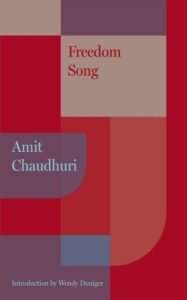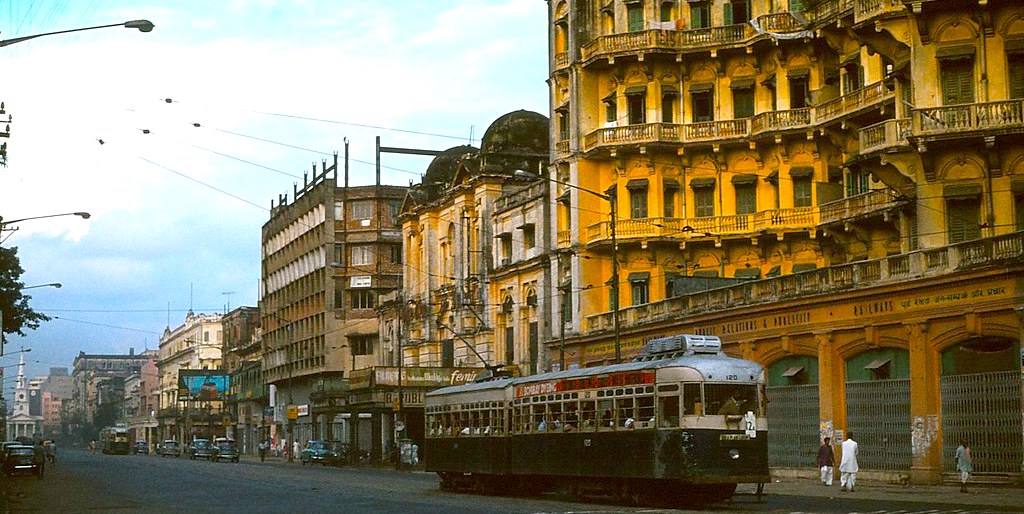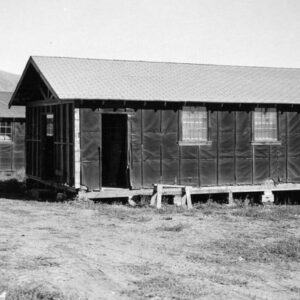A Quiet Roar: Wendy Doniger on Amit Chaudhuri’s Freedom Song
“True freedom may lie in the art that can express, deeply embedded in ordinary family life, the political attachments that shape and misshape that life.”
Freedom Song, Amit Chaudhuri’s third novel, is set in Calcutta in 1993. The book is pointillist in form, capturing both the inner and outer voices of its many characters. If Dylan Tomas, with his uncanny ear for unspoken thoughts, had written Under Milk Wood set not in a Welsh village but in an Indian city, this might be it. (Hilary Mantel has compared Chaudhuri’s approach to fiction to Proust. Colm Tóibín has likened it to both Proust and Joyce. As far as I know, no one has linked Chaudhuri to Dylan Tomas.)
Freedom Song is peopled by two branches of a middle-class Hindu family who live in two residential neighborhoods in South Calcutta. One branch consists of Khuku and her husband, Shib. Nearby live Khuku’s brother Bhola, his son (Bhaskar) and daughter (Piyu), and his wife (who has a name but is almost always referred to as Bhaskar’s mother). Other sons and daughters of both branches have left for America or Germany.
As the novel opens, Khuku’s old friend Mini, recuperating from an illness, is living with Khuku. Eventually a few rather ordinary things happen: Mini gets better and moves back to her own home with her aging sister, who soon dies. Shib comes out of retirement to work for an old, failing candy factory. Bhaskar gets involved with the Indian Communist Party, distributes their newspaper (Ganashakti, “Power to the People”), and acts in their street theater. Tough his parents have trouble finding a girl for him to marry, because he has no job and is a Communist, eventually he does get married. Chaudhuri leaves you, at the end of the book, at the beginning of a new episode: Khuku is about to visit someone. That’s it. Finis.
The seeds of the new politics of Hindu nationalism in the twenty-first century are very much present in Chaudhuri’s novel of the 1990s.Instead of a single plot, Freedom Song provides hundreds, some no more than a sentence long. You could start reading it almost at random and have the same sense of having just been dropped, invisible, into a house in which you are eavesdropping on several ongoing and overlapping conversations and internal meditations. But almost every single sentence reveals an unexpected thought or vivid memory or dramatic perception that transfigures the banausic details of the lives of the people in the story. Sometimes these thoughts are theirs, sometimes the author’s.
Chaudhuri has spoken about his work as “a refutation of the spectacular that comprises the exotic, in favor of the mundane, the everyday, and the transfiguration of the mundane.” As James Wood puts it, “In Freedom Song…Chaudhuri writes superbly about family life in Calcutta, about domestic rhythms and emotional counterpoint.” And more generally, “The effect is closer to documentary than to fiction; gentle artifice—selection, pacing, occasional dialogue—hides overt artifice.”
Let me trace just one of the many plots, one that is particularly close to documentary: it concerns Hindu attitudes to Muslims. It jumped out at me because it is about something I care about very much; other readers will find that the book is about their own, very different concerns—animals, perhaps (the wonderful birds and cats!), or the different neighborhoods of Calcutta, or family dinners (the food!), or music, or marriage.
Politics do not play an obvious role in this book. What Colm Tóibín remarked of A Strange and Sublime Address, Chaudhuri’s first novel, applies here too: “Although politics and a sense of public affairs are allowed into the narrative, they are there glancingly, as part of the favour of things, and are no more important than anything else.” But politics are still important; everything here is important. The subject of Hindu-Muslim tension, though dispersed into tiny spots so scattered that you might miss them if you weren’t looking for them, is crucial.
The book takes place in 1993, just after Hindu militants had demolished the ancient mosque of Babur, the Babri Masjid, in Ayodhya, on December 6, 1992, an event that led to mass riots and the loss of thousands of lives. There are just two explicit references to “the troubles far away in Ayodhya,” but there are many oblique references to the destruction of mosques.
The central characters are not particularly devout Hindus; Khuku and Mini do not believe in Ram or Krishna, though Mini is “something of a devotee of Ramakrishna and Swami Vivekananda,” and Bhaskar’s mother has a prayer room with pictures of Ramakrishna, Lakshmi, Saraswati, Kartik, and Krishna. More significant, Khuku prefers the Muslim poet Nazrul Islam to Tagore (an idea close to blasphemy for a Bengali), and from childhood she has loved to sing a Hindu (yes, Hindu) devotional song that Nazrul Islam had composed “in a moment of ecstasy.”
Mini’s strong anti-Muslim bias, however, gradually begins to infect Khuku. At one point, Mini says, “In fact, it was no bad thing that they toppled that mosque,” and, “No bad thing,” says Khuku, who, we are now told, “agreed with everything that Mini said.” The idea of an anti-Muslim bias is suggested in the very first sentence in the book: “It was a solitary voice, saying Allah-hu-akbar and other familiar but incomprehensible syllables.” Incomprehensible to whom?
A couple of pages later we are told that the hearer was Khuku, who remarks to Mini, “I was woken by the azaan,” to which Mini replies, “They are going too far! And…it isn’t really Indian, it sounds like Bedouins.” Khuku’s bias is also projected onto the reference to the muezzin as “The singer, if one could call him such…” And when the muezzin on a later occasion awakens Khuku, this time she thinks at first it is a mosquito humming near her ear, but then, “It reminded her that there were altogether too many Muslims around her.”
Tis indoctrination continues: “Each day, at some point, they talked of the Muslims. They talked of how, by the next century, there would be more Muslims than Hindus in the country. Mini, being the teacher, had the facts and figures. She told Khuku that ‘population control’ was meant for Hindus alone, and Khuku, listening to Mini, began to see Muslims everywhere. They grew excited about the azaan on the loudspeakers, and about Muslim festivals in which people beat themselves with whips and cords.”
And on another occasion, Mini argues, “What if one mosque had gone—for hundreds of temples had been destroyed before. She could not understand what the fuss was about…‘Who’ll rebuild those temples?’” And Khuku replies, “That’s right…No one talks about them.”
The only significant Muslim in the book is a musician named Suleiman Hussein who comes twice a week to Khuku’s house to accompany her on the tabla. Khuku was once a famous singer, as we learn only late in the book, when the radio plays a recording of one of her songs. (Chaudhuri himself is a well-known singer of classical Indian music, as was his mother.) On one occasion, Suleiman apologizes for his faith: “‘It is the word of God,’ he said, shamefaced and tender about this perpetual nuisance.”
But by this time, Khuku has been hardened: “See how stubborn they are, she thought; and just the other day they were quaking with fear.” And later, when bombs explode in Bombay, Khuku says: “Let’s see what they do!…They won’t be able to harm me…Suleiman came yesterday…He looked quite pleased.”
But Khuku’s indoctrination began long ago, as a child, when her older brother had told her about “Musholmaans… ghosts who haunted the dark and hilly regions of Sylhet.” Sylhet was the family’s original home, lost in Partition, when it became part of East Pakistan (later Bangladesh), the home from which they had fled, eventually to Calcutta.
There are numerous references to Sylhet in the book and one strong description of Partition: “Then the upheaval came, and friends, brothers, teachers, magistrates, servants, shopkeepers were all uprooted, as if released slowly, sadly, by the gravity that had tied them to the places they had known all their lives, released from an old orbit…The votes were counted after the referendum; their country was gone; first they went back to the village where their mother had died…then a bus to Shillong.”
In all the discussions of the ways that Narendra Modi has whipped up and mobilized anti-Muslim sentiment in India, I’ve read nothing that so well explains how Modi is able to capitalize on a deep, abiding resentment that is there in the hearts of many Hindus in India. (Though Sudhir Kakar’s The Colors of Violence does go a long way to explain it.) At one point, Khuku says, “I might even vote for the BJP. Why not?”
Freedom Song, Chaudhuri calls his book, and freedom is always at issue in politics. The seeds of the new politics of Hindu nationalism in the twenty-first century are very much present in Chaudhuri’s novel of the 1990s. Bhaskar’s Communism involves both the family politics of finding a wife and a broader yearning for political definition on his part that may be compared to that of his aunt. It also reflects the old politics of class long prevalent in Calcutta.
True freedom may lie in the art that can express, deeply embedded in ordinary family life, the political attachments that shape and misshape that life, chronicling them glancingly but always tellingly. And Chaudhuri shows us that, in looking at them, we have it in us to look beyond them.
Yes, alongside the many other ordinary family concerns, individual dreams and tragedies, woven into this complex novel, politics does indeed play a part. There is a stunning sentence about the curfew that was enforced after the destruction of the Babri Masjid: “For the seven days of the curfew the country had been like a conch whose roar you could hear only if you put your ear to it.” That roar is there throughout the book, if you listen to it.
__________________________________

From Freedom Song by Amit Chaudhuri, introduction by Wendy Doniger. Copyright © 2024. Available from New York Review Books.




















